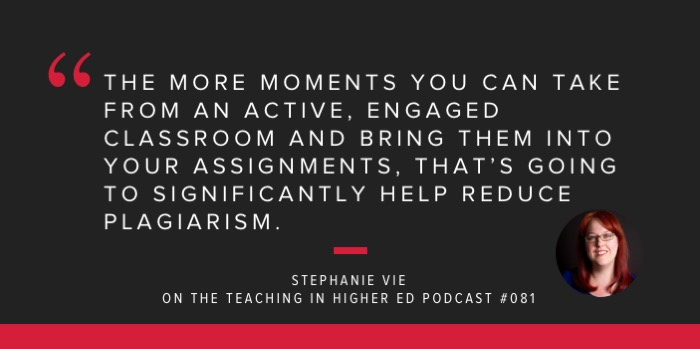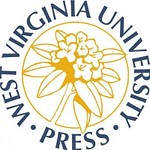Podcast (tihe_podcast):
Play in new window | Download | Transcript
Subscribe: Apple Podcasts | Spotify | RSS | How do I listen to a podcast?
Stephanie Vie discusses the ethical considerations of using Turnitin and other automatic plagiarism checkers.
Guest: Stephanie Vie
twitter: @digiret
email: Stephanie.Vie@ucf.edu
Academia: https://ucf.academia.edu/StephanieVie
Stephanie Vie researches the construction of digital identities in social media spaces as well as critical approaches to composing technologies such as plagiarism detection services. Her research has appeared in First Monday; Computers and Composition; Computers and Composition Online; Kairos: Rhetoric, Technology, and Pedagogy; and The Community Literacy Journal.
She is a Reviews Section Co-editor with Kairos; a Project Director with the Computers and Composition Digital Press; and an editorial board member of the undergraduate research journal Young Scholars in Writing.
Her doctorate from the University of Arizona (2007) is in Rhetoric, Composition, and the Teaching of English, and her dissertation, “Engaging Others in Online Social Networking Sites: Rhetorical Practices in MySpace and Facebook,” examined the use of privacy settings in these sites within a Foucauldian framework. More
Quote
The more moments you can take from an active, engaged classroom and bring them into your assignments, that’s going to significantly help reduce plagiarism.
-Stephanie Vie
Recommendations
Bonni:
- Go for a walk. It’s easy to forget how great it feels walk.
Stephanie:
- Book: My Freshman Year* by Rebecca Nathan
- App: Wunderlist for creating to-do lists
- App: Toggl for time tracking
Are You Enjoying the Show?
- Rate/review the show. Please consider rating or leaving a review for the Teaching in Higher Ed podcast on whatever service you use to listen to it on (iTunes, Stitcher, etc.). It is the best way to help others discover the show.
- Give feedback. As always, I welcome suggestions for future topics or guests.
- Subscribe. If you have yet to subscribe to the weekly update, you can receive a single email each week with the show notes (including all the links we talk about on the episode), as well as an article on either teaching or productivity.



Turnitin does offer a private-to-your-institution repository, but when I asked for a quote, it was beyond our ability to pay. (I’m tempted to think that it’s priced to discourage use.) If you’re concerned about the economic issue of how you fund writing instruction, it’s actually an anti-solution.
I’ve seen some creative, intentional uses of Turnitin as part of a complete writing pedagogy, but I think this episode raises some great questions about its effect on the classroom environment which every faculty member needs to address.
Thanks, Joe. The topic/episode certainly drummed up quite a bit of conversation on Twitter. I had no idea. It certainly has got me thinking, too…
I found the perspective that Stephanie brought to this conversation really helpful in framing how I’ll handle plagiarism issues going forward when I teach. In the past, I’ve probably been a bit too hard-lined on citations and policy, without looking at the broader context of the student experience/situation.
Sadly, it’s been my experience that a lot of faculty are either unwilling or unable to work with students to confront/teach issues related to plagiarism. That’s influenced me taking a harder line, easily rationalized by the “if I don’t address it, who will?” line of thinking.
The conversation here reminds me that taking extreme positions on either end of the spectrum isn’t as helpful as the broad middle ground (and better strategies) to handle these issues. I appreciate Stephanie highlighting a lot of the ethical considerations here — as well some practical ways to address plagiarism proactively. It will certainly influence my thinking going forward in how I set expectations and bring a more holistic approach to this issue.
Thanks to you both!